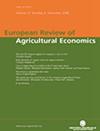政策引导的有机农田扩张:对食品价格和福利的影响
IF 3.5
2区 经济学
Q2 AGRICULTURAL ECONOMICS & POLICY
引用次数: 0
摘要
公共政策越来越多地支持扩大有机农业,将其作为食品和环境倡议菜单的一部分。这种扩张的一个很少研究但至关重要的因素,特别是考虑到有机作物产量较低的科学证据,是它对整体粮食生产和粮食价格的影响,尤其是对贫困家庭的影响。在本文中,我们首先建立了各国生产和消费有机食品的倾向与其人均收入之间的正经验关系。这种相关性表明,即使富裕国家的消费者能够从有机农田份额的增加中受益,贫穷国家的消费者也可能面临更高的传统食品价格。然后,我们开发并校准了一个世界粮食需求和供应模型,以评估政策驱动的有机农田扩张的影响。我们对四种主要谷物和油籽的研究结果表明,将富裕国家的有机农田份额从3%提高到15%,会使贫穷国家的粮食价格上涨6.3%,中心值为1.2-2.5%,消费者福利也相应降低。模型参数化表明,贫穷国家的农民从更高的作物价格中受益,而富裕国家的消费者基本上不受影响,有时也会受益。在所有情况下,贫穷国家的消费者承担了大部分扭曲负担。在我们首选的参数化中,富裕国家的耕地需要增加3%,以抵消贫穷国家的粮食价格上涨。本文章由计算机程序翻译,如有差异,请以英文原文为准。
Policy-induced expansion of organic farmland: implications for food prices and welfare
Public policies increasingly support the expansion of organic agriculture as part of a menu of food and environmental initiatives. A little-studied yet crucial element of such expansion, especially in light of scientific evidence on lower yields of organic crops, is its impact on overall food production and food prices, especially for poorer households. In this paper, we first establish a positive empirical relationship between countries’ propensity to produce and consume organic foods and their per-capita income. Such correlation suggests that, even if rich countries’ consumers can benefit from an increase in the organic farmland share, poor countries’ consumers would likely face higher conventional food prices. We then develop and calibrate a model of world food demand and supply to assess the implications of a policy-driven expansion in organic farmland. Our results for four major grains and oilseeds show that raising the organic cropland share in rich countries from 3 to 15 per cent increases food prices in poor countries by up to 6.3 per cent, with central values of 1.2–2.5 per cent, and a commensurate reduction in consumer welfare. Model parameterisations indicate that farmers in poor countries benefit from higher crop prices, while consumers in rich countries are largely unaffected and sometimes benefit. In all cases, poor countries’ consumers bear most of the distortion burden. In our preferred parameterisation, a 3 per cent increase in cropland in rich countries is needed to offset the food price increase in poor countries.
求助全文
通过发布文献求助,成功后即可免费获取论文全文。
去求助
来源期刊

European Review of Agricultural Economics
管理科学-农业经济与政策
CiteScore
6.60
自引率
5.90%
发文量
25
审稿时长
>24 weeks
期刊介绍:
The European Review of Agricultural Economics serves as a forum for innovative theoretical and applied agricultural economics research.
The ERAE strives for balanced coverage of economic issues within the broad subject matter of agricultural and food production, consumption and trade, rural development, and resource use and conservation. Topics of specific interest include multiple roles of agriculture; trade and development; industrial organisation of the food sector; institutional dynamics; consumer behaviour; sustainable resource use; bioenergy; agricultural, agri-environmental and rural policy; specific European issues.
Methodological articles are welcome. All published papers are at least double peer reviewed and must show originality and innovation. The ERAE also publishes book reviews.
 求助内容:
求助内容: 应助结果提醒方式:
应助结果提醒方式:


